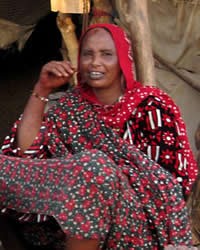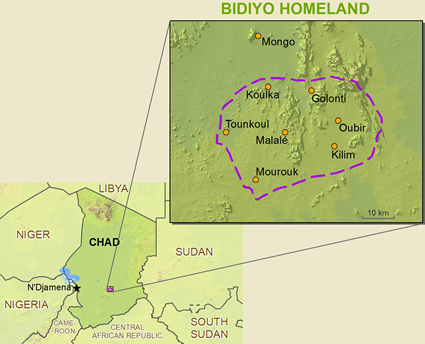Along with 14 other distinct minority ethnic groups living in the same region, the Bidio are collectively denoted by the term Hadjerai, which in Arab means, "Of the stones." Though the 15 Hadjerai groups speak different languages, all of them share many common traits and are geographically and culturally intertwined.
The Bidio people have a powerful spirit of independence. In the pre-colonial days, they repeatedly clashed with the slave-raiding razzias in their territory. Also, political unrest among the surrounding tribes, who tried to bring them under their control, forced many of them to flee to the mountains. This tradition of independence has also led to frequent clashes with the central government after Chad gained independence in 1960, largely because of the attempts by the then government to force them to move from the hills to the plains. The Bidio guard their independence fiercely and stay united to maintain it. They also were among the staunchest supporters of the rebels during the Chadian Civil War.
The Bidios speak Bidiya (also known as Bidyo), an Afro Asiatic language, which belongs to the East Chadic B family of languages. They inhabit the mountainous, semi desert Guera Region of South Central Chad in Africa.
Most of the Bidios are hard-working, small farmers. They raise crops like millet, sorghum, peanuts, and okra to meet their family's needs. They also cultivate cotton and groundnuts, the two chief cash crops, aside from rice. Their main diet comprises a millet paste eaten with a sauce made from wild leaves, meat, or dried fish.
Being in a semidesert, they must haul water from faraway sources. Finding clean water is a challenge. They are also resourceful people who make ropes, mats and fans from palm fronds for their own use. They also make vessels and jars of clay for storing and transporting food and water.
Most receive income from selling surplus millet and from transporting goods for others. They trade with the nearby Arabs regularly in order to purchase items they cannot otherwise obtain. In these trades, they trade millet for milk, meat and items made by Arab blacksmiths.
Each Hadjeray group, including the Bidio, is divided into several villages. Most villages have several clans, each of which lives in its own neighborhood. A chief or headman runs each village, who is primarily in charge of settling disputes between the villagers. Every village also has a chief of the land, who holds the religious power of the village.
Most Bidio are rural and live in round, mud-brick huts with cone-shaped thatch roofs. In town, the dwellings are also made of mud-brick, but are rectangular and have flat roofs. The villages comprise several compounds. Each compound contains several huts belonging to an extended family.
Bidio women wear colorful print fabrics, which are wrapped around their bodies or tailored into dresses. Women wear head coverings when they are outside their compounds. The men wear Western-style pants with shirts, or long robes with or without pants.
Polygamy is a common and widely accepted practice among the Bidio. Sanctioned by the law, it automatically permits polygamy unless spouses specify that this is unacceptable upon marriage. Although violence against women is prohibited by law, domestic violence is common. The law also prohibites female genital mutilation, but the practice is widespread and deeply rooted in tradition. About 90% of the women have undergone genital mutilation. Although property and inheritance laws based on the French code, do not discriminate against women, local leaders adjudicate most inheritance cases in favor of men, according to traditional practice. Many a time, women are forced into prostitution and also exposed to HIV because of the infidelity of their husbands.
Many Bidio villages have a primary school, but teachers are inadequate. The children in this region do not take efforts to attend a formal school education or drop out of school early as they are unfamiliar with the languages (French and Arabic) being taught at the public schools. The resulting low literacy rates affects other areas of life as well, affecting things like health and employment opportunities. Malnutrition and infant mortality rates are also very high.
A small number of Bidio people have cell phones, kerosene lanterns and flashlights. Many have short-wave radios and digital watches. Some Bidio even own bicycles or mopeds.
The most common belief that unites all the different ethnic groups of the Bidio is their belief in margais, invisible spirits that control the natural elements. This belief has survived the rapid conversion of most Bidio to Islam during the colonial period, despite attempts by the French colonial authorities to avoid Islamization through the promotion of Christian missions. Magic and Sorcery are part of their everyday lives. Cult leaders control them.
About three percent of the people living in the Guera Region are Christians. Most of them are animists and nearly ten percent worship traditional nature spirits. Most of the Bidio people have never heard the gospel even once and have no Scripture in their language. Even though Bible translation is happening, low literacy levels remain a hindrance to access of Scripture.
The benefits of modernization seldom reach the people in the mountains such as the Bidios. As a result, their economy continues to stay at the marginal levels. Any relief or developmental programs take years to reach them. Chad has the third highest rate of child marriage in the world and their life expectancy remains a low 51.
There is a great need for educational workers to improve the literacy rate. They also need women centered empowerment programs to overcome oppression of women brought on by traditional and religious practices.
Ask God to raise up more missionaries, Christian educators and medical workers for the Bidio people.
Ask God to raise up anointed translators.
Pray for TEAM, a mission organization that sends missionaries to work in community health, teach English, run a radio station, and use traditional and oral storytelling to spread the gospel.
Pray for Mission Africa as they carry the gospel, along with the missionaries of the TEAM, to reach and rehabilitate the marginalized and vulnerable Bidio women. Through their project named Acacia, they aim to bring hope, healing and a future in Jesus Christ for the women.
Pray for the Guera Literacy Project, which aims to equip local communities through adult literacy classes and preschool programs, to reach them in their own languages.
Pray this will be the decade of a massive movement to Christ among the Bidio people of Chad.
Scripture Prayers for the Bidio in Chad.
| Profile Source: Joshua Project |











